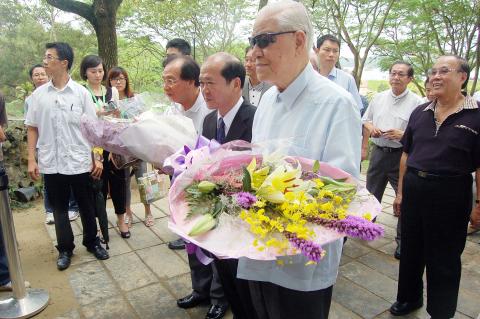Former president Lee Teng-hui (李登輝) said yesterday he had declined an invitation to attend President Ma Ying-jeou’s (馬英九) inauguration ceremony on Sunday as “a form of silent protest” about Ma’s policies.
Speaking at a press conference in Greater Tainan, the 89-year-old said he was aware that a series of massive protests would coincide with the ceremony and added that people have the right to voice their opinion.
However, as a former president, he said he would rather offer his experience to Ma than resort to “extreme ways” to embarrass the incumbent president.

Photo: Peng Hsien-chun, Taipei Times
Lee also clarified his relations with the Taiwan Solidarity Union, the party he helped found in 2001. Lee said that at present he has no direct connection with the party, even though the party views him as its “spiritual leader.”
Lee, often dubbed “Taiwan’s Mr Democracy,” was on the second day of his three-day visit to southern Taiwan, the second such trip following his recovery from cancer surgery. He visited Greater Kaohsiung and Pingtung County last month.
In a stop at the Wushantou Reservoir (烏山頭水庫) in Greater Tainan, Lee praised late Japanese engineer Yoichi Hatta as the best example of the “Japanese spirit.”
Lee paid tribute to Hatta (1886-1942), laying flowers at his statue, which is located on a hill that overlooks the reservoir.
Hatta was the designer of Chia-nan Irrigation Waterways and the Wushantou Reservoir, which were built between 1920 and 1930 during the Japanese colonial period. His work improved rice harvests in today’s Yunlin, Chiayi and Tainan areas, allowing rice to be harvested three times a year.
While his design was questioned and the funding was at one point suspended, Hatta’s determination to complete the project never wavered, Lee said, adding that the engineer showed compassion to Taiwanese throughout his stay in the nation.
“History proved that Hatta was right,” Lee said.
That is why people in the south have always shown the utmost respect to Hatta and his wife, who were both buried in Taiwan, he said.
“I have never seen any politician in Taiwan — or Japan — who has the same determination, perseverance and compassion as Hatta,” said Lee, who choked several times and almost burst into tears as he recalled Hatta’s contributions and humanity.
Lee later met with Chiayi Mayor Huang Min-hui (黃敏惠) of the Chinese Nationalist Party (KMT), the first time he has been received by a KMT official during his two recent trips to the south.
Lee reiterated his call to privatize state-run companies and to release state-owned land to stimulate local economies.
Citing the example of Japan’s national railway company, Lee said it had serious management problems after World War II and was not profitable until it was privatized and split into six separate companies.
Lee is scheduled to return to Taipei today.
He is set to embark on another trip to southern Taiwan at the end of this month, to visit Yunlin County.

The CIA has a message for Chinese government officials worried about their place in Chinese President Xi Jinping’s (習近平) government: Come work with us. The agency released two Mandarin-language videos on social media on Thursday inviting disgruntled officials to contact the CIA. The recruitment videos posted on YouTube and X racked up more than 5 million views combined in their first day. The outreach comes as CIA Director John Ratcliffe has vowed to boost the agency’s use of intelligence from human sources and its focus on China, which has recently targeted US officials with its own espionage operations. The videos are “aimed at

STEADFAST FRIEND: The bills encourage increased Taiwan-US engagement and address China’s distortion of UN Resolution 2758 to isolate Taiwan internationally The Presidential Office yesterday thanked the US House of Representatives for unanimously passing two Taiwan-related bills highlighting its solid support for Taiwan’s democracy and global participation, and for deepening bilateral relations. One of the bills, the Taiwan Assurance Implementation Act, requires the US Department of State to periodically review its guidelines for engagement with Taiwan, and report to the US Congress on the guidelines and plans to lift self-imposed limitations on US-Taiwan engagement. The other bill is the Taiwan International Solidarity Act, which clarifies that UN Resolution 2758 does not address the issue of the representation of Taiwan or its people in

US Indo-Pacific Commander Admiral Samuel Paparo on Friday expressed concern over the rate at which China is diversifying its military exercises, the Financial Times (FT) reported on Saturday. “The rates of change on the depth and breadth of their exercises is the one non-linear effect that I’ve seen in the last year that wakes me up at night or keeps me up at night,” Paparo was quoted by FT as saying while attending the annual Sedona Forum at the McCain Institute in Arizona. Paparo also expressed concern over the speed with which China was expanding its military. While the US

SHIFT: Taiwan’s better-than-expected first-quarter GDP and signs of weakness in the US have driven global capital back to emerging markets, the central bank head said The central bank yesterday blamed market speculation for the steep rise in the local currency, and urged exporters and financial institutions to stay calm and stop panic sell-offs to avoid hurting their own profitability. The nation’s top monetary policymaker said that it would step in, if necessary, to maintain order and stability in the foreign exchange market. The remarks came as the NT dollar yesterday closed up NT$0.919 to NT$30.145 against the US dollar in Taipei trading, after rising as high as NT$29.59 in intraday trading. The local currency has surged 5.85 percent against the greenback over the past two sessions, central